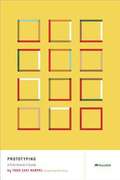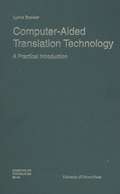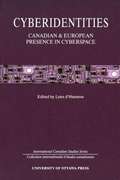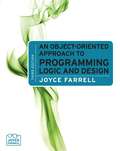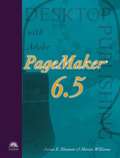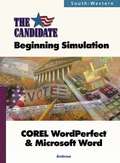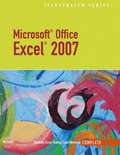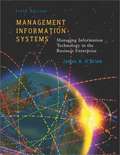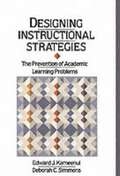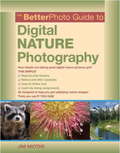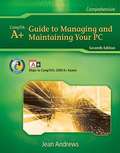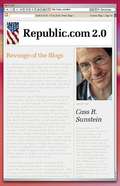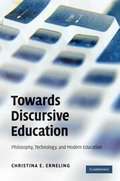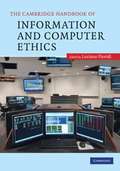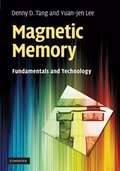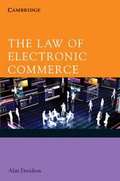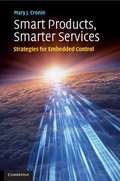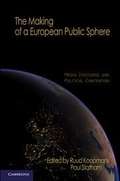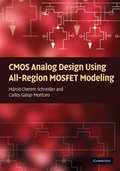- Table View
- List View
Prototyping
by Todd Zaki WarfelPrototyping is a great way to communicate the intent of a design both clearly and effectively. Prototypes help you to flesh out design ideas, test assumptions, and gather real-time feedback from users.With this book, Todd Zaki Warfel shows how prototypes are more than just a design tool by demonstrating how they can help you market a product, gain internal buy-in, and test feasibility with your development team.
Delete
by Viktor Mayer-SchönbergerDelete looks at the surprising phenomenon of perfect remembering in the digital age, and reveals why we must reintroduce our capacity to forget. Digital technology empowers us as never before, yet it has unforeseen consequences as well. Potentially humiliating content on Facebook is enshrined in cyberspace for future employers to see. Google remembers everything we've searched for and when. The digital realm remembers what is sometimes better forgotten, and this has profound implications for us all. In Delete, Viktor Mayer-Schönberger traces the important role that forgetting has played throughout human history, from the ability to make sound decisions unencumbered by the past to the possibility of second chances. The written word made it possible for humans to remember across generations and time, yet now digital technology and global networks are overriding our natural ability to forget--the past is ever present, ready to be called up at the click of a mouse. Mayer-Schönberger examines the technology that's facilitating the end of forgetting--digitization, cheap storage and easy retrieval, global access, and increasingly powerful software--and describes the dangers of everlasting digital memory, whether it's outdated information taken out of context or compromising photos the Web won't let us forget. He explains why information privacy rights and other fixes can't help us, and proposes an ingeniously simple solution--expiration dates on information--that may. Delete is an eye-opening book that will help us remember how to forget in the digital age.
Teach Yourself Linux
by Robert BillingThis book will help to learn to set up a Linux system, add applications, make things happen automatically, connect to the Internet, share files with other systems, and even apply the basics of programming.
American Privacy: The 400-year History of Our Most Contested Right
by Frederick S. LaneA page-turning narrative of privacy and the evolution of communication, from broken sealing wax to high-tech wiretapping.
Computer-Aided Translation Technology: A Practical Introduction
by Lynne BowkerLynne Bowker introduces the world of technology to the world of translation in this unique book, the first of its kind. Bowker reveals the role of technology in translation and how to use this ever developing tool.
Cyberidentities: Canadian and European Presence in Cyberspace
by Leen D'HaenensThis innovative study explores diverse aspects of Canadian and European identity on the information highway and reaches beyond technical issues to confront and explore communication, culture and the culture of communication.
Food Preparation (3rd edition)
by Robert G. Haines R. T. MillerUpdated with 2005 USDA dietary guidelines and the new food pyramid, along with new materials on sanitation, computerized food service management systems, first aid and fire safety procedures, diet trends, and temperatures for cooking, cooling, and hot and cold storage, this comprehensive text emphasizes cost-effective and safe techniques along with advice on professional development. In 30 chapters Haines and Miller cover such topics as careers in food service, sanitation, tools and equipment, safety, nutrition, cooking methods and techniques, breakfast preparation, batter cooking, appetizers, seasonings, salads, cheeses, fruit, vegetables, pasta, soups, meat and fish, breads, cookies, pastries and specialty desserts. The also include hundreds of large-scale recipes (finally we know how to make six Key Lime pies at once), a glossary, and appendices on such topics as the mathematics related to food preparation. They have included a number photographs so well-done readers may be tempted to eat the pages.
An Object-oriented Approach to Programming Logic and Design (3rd edition)
by Joyce FarrellAn Object-Oriented Approach to Programming Logic and Design, Third Edition provides the beginning programmer with a guide to developing object-oriented program logic. This textbook assumes no programming language experience. The writing is nontechnical and emphasizes good programming practices. The examples are business examples; they do not assume mathematical background beyond high school business math. Additionally, the examples illustrate one or two major points; they do not contain so many features that students become lost following irrelevant and extraneous details.
Desktop Publishing with Adobe Pagemaker 6.5 for Windows
by James E. Shuman Marcia WilliamsDesigned for use in front of the computer, this spiral-bound text offers a top down approach, showing students the completed project first, then leading them through its creation.
The Candidate: Beginning Simulation for COREL WordPerfect and Microsoft Word
by Ann P. AmbroseThe Candidate is a beginning word processing simulation that is designed to develop word processing skills while completing tasks such as formatting letters, memorandums, tables, press releases, and reports.
Microsoft® Office Excel® 2007: Illustrated Complete
by Elizabeth Eisner Reding Lynn WermersThis Microsoft Office 2007 Illustrated Series book will appeal to all the learners in your classroom, from the computer rookies to the computer hotshots. It covers the essential information that students need to know about how to use Microsoft Excel 2007. Our signature two-page spread design has been updated and refreshed to take full advantage of the new features of the Office 2007 software. This practical, easy to navigate book provides you with the essential knowledge you need to succeed in both the classroom and beyond.
Management Information Systems: Managing Information Technology in the Business Enterprise (6th edition)
by James A. O'BrienThis book will be very much useful for business students who must be conversant with the tools of MIS to become successful managers and entrepreneurs. Students learn how Information Technology provides them with a powerful managerial resource that can help manage business operations, make better decisions, and gain competitive advantages.
Crysis
by Peter WattsMANHATTAN IS UNDER NEW MANAGEMENT. THEY'RE NOT FROM AROUND HERE. Welcome to the Big Apple, son. Welcome to the city that never sleeps: invaded by monstrous fusions of meat and machinery, defended by a private army that makes Blackwater look like the Red Cross, ravaged by a disfiguring plague that gifts its victims with religious rapture while it eats them alive. You've been thrown into this meat grinder without warning, without preparation, without a clue. Your whole squad was mowed down the moment they stepped onto the battlefield. And the chorus of voices whispering in your head keeps saying that all of this is on you: that you and you alone might be able to turn the whole thing around if you only knew what the hell was going on. You'd like to help. Really you would. But it's not just the aliens that are gunning for you. Your own kind hunts you as a traitor, and your job might be a bit easier if you didn't have the sneaking suspicion they could be right. . . .From the Trade Paperback edition.
Designing Instructional Strategies: The Prevention of Academic Learnig Problem
by Edward J. Kameenui Deborah C. SimmonsDesigning Instructional Strategies: The Prevention of Academic Learning Problems is about designing and delivering instruction to students with academic learning problems. These students are identified as learning disabled, mildly handicapped, or emotionally disturbed who receive services in special education or general education settings.
The BetterPhoto Guide to Digital Nature Photography
by Jim MiotkeFrom the tiniest ladybug to a towering glacier, from a horse running in a field to a leaf falling slowly from a tree, nature subjects offer some of the greatest challenges and the greatest rewards to photographers. In the BetterPhoto tradition, here's a complete photo course in a book. Hands-on lessons cover every aspect of digital nature photography, from buying the right camera for close-ups, landscapes, and movement, to understanding how the camera works, to taking great pictures. Author Jim Miotke uses straightforward text and inspiring yet informative photos to show the best ways to approach nature photography. Everything a beginner or intermediate photographer needs to know is here, including a buyer's guide, full information on camera features, file formats and settings, exposure, low-light photography, filters and white balance, composition and lens choice, creative ideas, manipulating, and printing, along with a glossary and list of useful websites. The Better Photo Guide to Digital Nature Photography helps photographers everywhere get great photos in the great outdoors.From the Trade Paperback edition.
Graduate Savvy: Navigating the World of Online Higher Education (2nd edition)
by Jeffrey L. GreenGraduate Savvy begins with a compelling exploration of online learning as it moves into the heart of the text, which is to help you succeed should you decide to enroll in a web-based program. Topics such as plagiarism, Bloom's Taxonomy, scholarly sources, and academic writing make this a must read for all graduate learners.
A+ Guide to Managing and Maintaining Your PC
by Jean AndrewsWritten by best-selling PC repair author and educator Jean Andrews, the seventh edition of A+ Guide to Managing and Maintaining Your PC maps fully to CompTIA's 2009 A+ Exam objectives. This full-color guide is the most complete, step-by-step book available for learning the fundamentals of supporting and troubleshooting computer hardware and software. At the same time, it prepares readers to successfully pass the A+ 220-701 and 220-702 exams. The new edition is formatted to support any teaching or learning style and course format, featuring an essentials-to-practical organization within each chapter and inclusion of tabs distinguishing exam content. Further content and live demonstrations with Jean Andrews are available on the accompanying CD, making this new edition a total solution for PC repair.
Republic.com 2.0
by Cass R. SunsteinWhat happens to democracy and free speech if people use the Internet to listen and speak only to the like-minded? What is the benefit of the Internet's unlimited choices if citizens narrowly filter the information they receive? Cass Sunstein first asked these questions in 2001'sRepublic. com. Now, inRepublic. com 2. 0, Sunstein thoroughly rethinks the critical relationship between democracy and the Internet in a world where partisan Weblogs have emerged as a significant political force. Republic. com 2. 0highlights new research on how people are using the Internet, especially the blogosphere. Sunstein warns against "information cocoons" and "echo chambers," wherein people avoid the news and opinions that they don't want to hear. He also demonstrates the need to regulate the innumerable choices made possible by technology. His proposed remedies and reforms emphasize what consumers and producers can do to help avoid the perils, and realize the promise, of the Internet.
Towards Discursive Education: Philosophy, Technology, and Modern Education
by Christina E. ErnelingAs technology continues to advance, the use of computers and the Internet in educational environments has immensely increased. But just how effective has their use been in enhancing children's learning? In this thought-provoking book, Christina E. Erneling conducts a thorough investigation of scholarly journal articles on how computers and the Internet affect learning. She critiques the influential pedagogical theories informing the use of computers in schools - in particular those of Jean Piaget and 'theory of mind' psychology. Erneling introduces and argues for a discursive approach to learning based on the philosophy of Ludwig Wittgenstein and the psychology of Lev Vygotsky. This book not only addresses an urgent pedagogical problem in depth, but also challenges dominant assumptions about learning in both developmental psychology and cognitive science.
The Cambridge Handbook of Information and Computer Ethics
by Luciano FloridiInformation and Communication Technologies (ICTs) have profoundly changed many aspects of life, including the nature of entertainment, work, communication, education, healthcare, industrial production and business, social relations and conflicts. They have had a radical and widespread impact on our moral lives and hence on contemporary ethical debates. The Cambridge Handbook of Information and Computer Ethics provides an ambitious and authoritative introduction to the field, with discussions of a range of topics including privacy, ownership, freedom of speech, responsibility, technological determinism, the digital divide, cyber warfare, and online pornography. It offers an accessible and thoughtful survey of the transformations brought about by ICTs and their implications for the future of human life and society, for the evaluation of behaviour, and for the evolution of moral values and rights. It will be a valuable book for all who are interested in the ethical aspects of the information society in which we live.
Magnetic Memory
by Denny D. Tang Yuan-Jen LeeIf you are a semiconductor engineer or a magnetics physicist developing magnetic memory, get the information you need with this, the first book on magnetic memory. From magnetics to the engineering design of memory, this practical book explains key magnetic properties and how they are related to memory performance, characterization methods of magnetic films, and tunneling magnetoresistance effect devices. It also covers memory cell options, array architecture, circuit models, and read-write engineering issues. You'll understand the soft fail nature of magnetic memory, which is very different from that of semiconductor memory, as well as methods to deal with the issue. You'll also get invaluable problem-solving insights from real-world memory case studies. This is an essential book for semiconductor engineers who need to understand magnetics, and for magnetics physicists who work with MRAM. It is also a valuable reference for graduate students working in electronic/magnetic device research.
The Law of Electronic Commerce
by Alan DavidsonWritten specifically for legal practitioners and students, this book examines the concerns, laws and regulations involved in Electronic Commerce. In just a few years, commerce via the World Wide Web and other online platforms has boomed, and a new field of legal theory and practice has emerged. Legislation has been enacted to keep pace with commercial realities, cyber-criminals and unforeseen social consequences, but the ever-evolving nature of new technologies has challenged the capacity of the courts to respond effectively. This book addresses the legal issues relating to the introduction and adoption of various forms of electronic commerce. From intellectual property, to issues of security and privacy, Alan Davidson looks at the practical changes for lawyers and commercial parties whilst providing a rationale for the underlying legal theory.
Smart Products, Smarter Services: Strategies for Embedded Control
by Mary J. CroninWe are surrounded by products that have minds of their own. Computing power, in the form of microcontrollers, microprocessors, sensors, and data storage chips, has become so cheap that manufacturers are building connectivity and embedded intelligence into all types of consumer goods. These 'smart products' are fundamentally changing both the competitive landscape for business and the daily lives of consumers. This book analyzes the evolution of smart products to help managers understand the impact of embedded product intelligence on corporate strategy, consumer value, and industry competition. It describes four different ecosystem strategies for designing and launching smart products: the control-focused Hegemon, the standards-focused Federator, the high growth and brand-focused Charismatic Leader, and the disruptive industry Transformer. This ecosystem model is then applied to smart products in the automotive, wireless, energy, residential, and health industries. The book concludes with recommendations for successfully managing smart products and services.
The Making of a European Public Sphere
by Ruud Koopmans Paul StathamThis book investigates an important source of the European Union's recent legitimacy problems. It shows how European integration is debated in mass media, and how this affects democratic inclusiveness. Advancing integration implies a shift in power between governments, parliaments, and civil society. Behind debates over Europe's "democratic deficit" is a deeper concern: whether democratic politics can perform effectively under conditions of Europeanization and globalization. This study is based on a wealth of unique data from seven European countries, combining newspaper content analyses, an innovative study of Internet communication structures, and hundreds of interviews with leading political and media representatives across Europe. It is by far the most far-reaching and empirically grounded study on the Europeanization of media discourse and political contention to date, and a must-read for anyone interested in how European integration changes democratic politics and why European integration has become increasingly contested.
CMOS Analog Design Using All-Region MOSFET Modeling
by Márcio Cherem Schneider Carlos Galup-MontoroComparing bipolar technology briefly but otherwise not considering it, Schneider and Galup-Montoro (both electrical engineering, Federal U. of Santa Catarina, Brazil) focus on analog MOS (metal-oxide-semiconductor) circuits at the transistor level. They use an accurate but simple MOS transistor model for design, in order to reduce the distance between hand design and simulation results. Instead of the usual separate analytical formulas for the strong-inversion and weak-inversion operation regions of a building block, they provide simple formulas that are valid in all operation regions, including moderate inversion. The unified design is particularly suitable for analog design in advanced complementary MOS (CMOS) technologies. Among their topics are temporal and spatial fluctuations in MOSFETs (MOS field-effect-transistors), current mirrors, basic gain stages, operational amplifiers, and fundamentals of sampled-data circuits. The text is suitable for analog CMOS design courses. Annotation ©2010 Book News, Inc. , Portland, OR (booknews. com)
